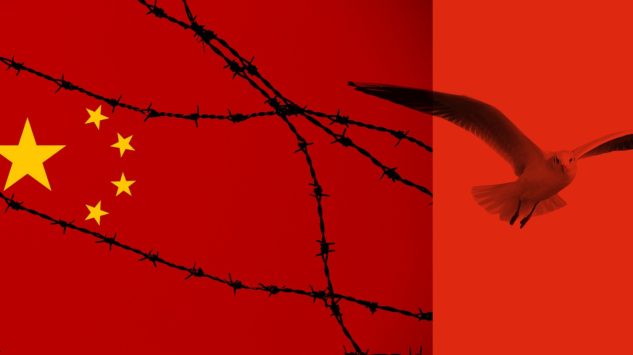Issue Briefs

Facilis Descensus Averno, (Descent into Hell is Easy)
Martin Hutchinson
October 25th, 2021
The gates of Hell are open night and day
Smooth the descent, and easy is the way:
But to return and view the cheerful skies
In this the task and mighty labor lies.”
Book VI of Latin poet Virgil’s Aeneid, translated by John Dryden, published in 1697 when poetry was poetry, is a useful window on China’s descent into renewed Communism – and indeed, the West’s tendencies in that direction. Residents of Eastern Europe and the former Soviet Union know how difficult and arduous it was to convert from Communism to capitalism, or even social democracy, but the road in the other direction is very smooth – at first.
China reverting to communism
China has made clear its intention to return to a much greater degree of state control of its economy than in recent years. It has taken effective control of several of the most independent-minded tech companies and has announced its intention to control the algorithms by which tech companies monitor and incentivize their users. It has pushed its largest real estate company, Evergrande, into a kind of slow-motion bankruptcy with government-favored creditors protected and has made it clear that the previous free-for-all in real estate must not continue.
The Chinese government has taken total control of local media and social media, even specifying the color of the signs welcoming home Huawei executive Meng Wanzhou, recently released from a Canadian jail. Finally, it has developed a hypersonic missile that appears superior to anything possessed by the West. There can be little doubt that Xi Jinping, far from being attracted by free-market capitalism, is trying to push China in the direction of a heavily militarized centrally planned economy, a more efficient version of the old Soviet Union.
So far, not too costly for Beijing
So far, the costs of this new direction appear minor. GDP growth in the third quarter was officially reported as 4.9%, down on the figures around 7% that had been reported before Covid-19, but still considerably greater than the sustainable pace of any Western economy. Heavy industry is suffering from power shortages, but that may be because China is attempting to produce a short-term drop in CO2 emissions ahead of the COP26 climate change summit next month. Indeed, construction of new coal-fired power plants appears to be going full steam ahead, and the existing coal mines have now been told to ramp up production.
West going socialist
In the West, the United States is also aiming in the direction of the command economy, though so far less determinedly. The Biden administration, not content with a $3 trillion per annum deficit, is seeking to add an extra $5-6 trillion in spending during the next decade, probably around $800 billion per annum (the final costings of their plan are not yet available, and the fudges need to be reversed to see the plan’s true cost). At the same time, environmental and other regulations are being ramped up, to have the same growth-deadening effect they had under the Obama administration. The West as a whole has adopted a Gosplan approach to monetary policy, seeking to keep interest rates at an artificial level far below that of a free market, aligning long-term rates with artificially low short-term rates through massive central bank bond purchases.
Centrally planned energy policies
The West is also moving towards a command-and-control approach in the energy sector, hoping through the COP-26 conference to set dates for zero carbon emissions that states will be compelled to meet, forcing markets in the production and use of energy far out of their freely-determined states to a central-planned Nirvana determined by international bureaucrats. With Donald Trump gone and Boris Johnson putty in the hands of his new wife, there is now no significant opposition to this madness.
Again, the costs of this new direction have so far been fairly minor. Interest rates have been far from equilibrium levels for well over a decade, and budget deficits correspondingly bloated, but only in the last few months has there been any upsurge in inflation. Asset prices have soared to the moon, making most opinion-formers much richer, albeit doing nothing for the poor slobs who don’t own New York penthouses, London town houses and chunky stock portfolios. Productivity growth has stagnated, except for in a few blessed quarters during President Trump’s administration when rates were raised and regulations cut. Public debts have spiraled, but except in Japan, where similar policies have been followed for 30 years, they have not yet reached a dangerous level.
Inflation is coming back
This appears now to be about to change. Inflation has reared its ugly head, so far to early 1990s levels. However, if interest rates are kept where they are, the negative real interest rates will push inflation rapidly higher. Supply-side shocks have manifested themselves – the last time they did so was in 1973, and that episode did not end well for anybody. Labor force participation in the United States has declined further than in the 2010-15 depression, far below the levels of the 1990s, towards the levels of the most inefficient economies in Western Europe. This is not only a huge drag on output but a tragedy for the permanently unemployed workers concerned, who will inevitably succumb to illness and drug addiction.
Chinese economy in turmoil
It also appears, though we cannot be sure because the national statistics are even more thoroughly falsified than in the West, that the same further deterioration is likely in China. Evergrande has now been joined in default by the Chinese developer Sinic; it seems likely that the entire Chinese property sector will collapse, as happened in Britain in the middle 1970s and in Japan in the late 1990s. As I can tell them from unpleasant experience in the British 1970s, the downward spiral this is likely to cause in the rest of the economy will be difficult for even China to hide and will unpleasantly affect the living standards of its people, especially its educated urban middle classes, who have done so well in the last three decades.
The Chinese economy has been buoyed for that period by an enormous surge in exports, as Western companies have allowed their supply chains to be hollowed out and replaced with Chinese suppliers. This effect is still ongoing as Chinese exports are continuing to rise this year, despite the world’s logistical difficulties. Should the West get serious about re-onshoring its production, as it should, the effect on Chinese living standards will be still more damaging.
From a Buick to a Zaporozhets economy
While rural Chinese have benefited only modestly from the new prosperity in this generation, urban Chinese will not take kindly to their living standards being reduced to those of 1970s Moscow, as the government increases its control over the economy. Their Buicks and Mercedes will be replaced by Wartburgs, Ladas or even Zaporozhets. President Putin claims to have owned a Zaporozhets in his youth. Having been driven in one I can tell you that to anyone used to Western automobiles it will feel primitive, utterly inadequate and indeed life-threatening (its top speed of about 30 mph makes it safe enough in itself, but a death trap if surrounded by other cars and trucks traveling at Western speeds.) In descending towards a centrally planned system, the Chinese people are about to replace their gleaming Buick or Mercedes economy with a Zaporozhets economy. They will not like it.
Declining standards of living in the West
The descent to a Zaporozhets economy will be even more disturbing for Americans and Western Europeans, who unless they are over 80 have never known anything like it. However, these Hellish economic policies, the direct reverse of those that produced the Industrial Revolution, will over time produce Hellish economic results, utterly failing to solve the challenge of the world’s population pressure and reducing ordinary people in even the wealthiest economies to a Soviet level of subsistence, their housing, transportation and consumer goods devastated by ever-more-draconian environmental regulations and grinding taxation. In Hell, with its power cuts, nothing works; in a Midwestern January without properly functioning heating you will long for Hell’s eternal fires.
Difficult to return from Hell
Returning from Hell, as the Latin poet Virgil pointed out, is very difficult indeed. The Eastern Europeans found this out the hard way when they abandoned their Soviet system and moved towards capitalism. Only in the least Communist Eastern European economies, such as Slovenia and Hungary, were the declines in living standards only modest; in the more thoroughly Communist countries, such as Ukraine, the decline was close to 70%, though the decline felt by the populace was less than that, because resource allocation improved somewhat.
After 30 years, the non-Soviet countries of Eastern Europe are now doing pretty well, with Western levels of education and rather better than Western European levels of entrepreneurship and quality of government. Even now however, Ukraine is a mess, while some countries such as Belarus, Georgia and Uzbekistan, have returned towards the Communism they were never entirely able to leave. For the Eastern European generation that was adult when Communism fell and did not get lucky in the chaos that followed, there has been little real improvement in living standards.
If we are to descend into Hell, and not pull ourselves back at the last moment, the real torture, for the West though not for the totalitarian China, will be knowing that the downward slope was not inevitable. Seductive but pernicious Siren voices led us to our destruction.
This article was originally published on the True Blue Will Never Stain http://www.tbwns.com
The views and opinions expressed in this issue brief are those of the author.
 |
Martin Hutchinson is a GPI Fellow and was a merchant banker with more than 25 years’ experience before moving into financial journalism. Since October 2000 he has been writing “The Bear’s Lair,” a weekly financial and economic column. He earned his undergraduate degree in mathematics from Trinity College, Cambridge, and an MBA from Harvard Business School. |